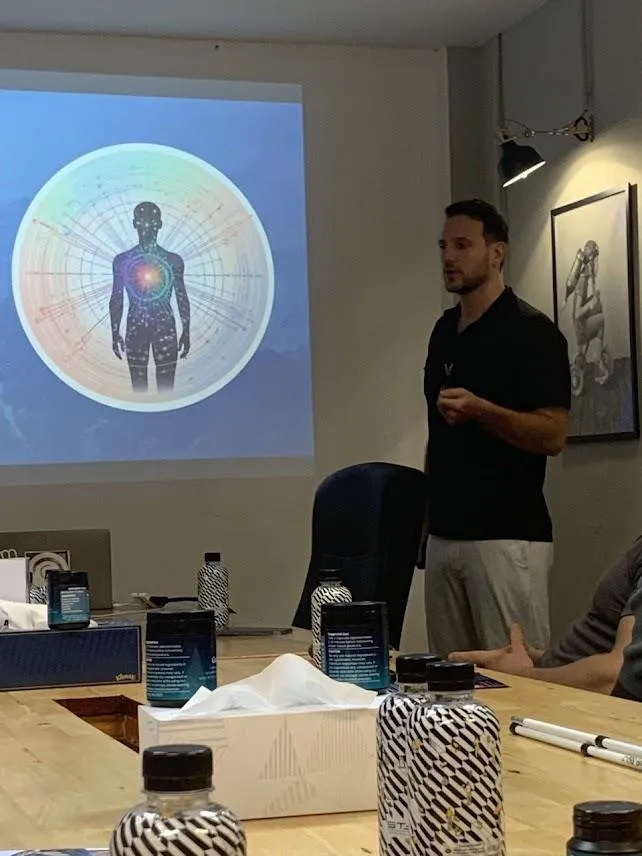Do you have a calling?
Are you looking for yourself?
Henosis is founded upon the idea that every human being in unique and has a purpose. You have aspects that make you so different to every other human on the planet, yet such deep similarities that show we're all the same.
Origin Story of Henosis
The Greek word henosis refers to the process of achieving a state of oneness or unity with the divine. This concept has been central to many mystical and philosophical traditions throughout history, particularly in ancient Greece.
The term henosis comes from the Greek word ἕνωσις, which means "union" or "merging." It was used by several ancient Greek philosophers, including Plotinus and Proclus, to describe the goal of mystical practice.
For these philosophers, the goal of mystical practice was to transcend the limitations of the physical world and achieve a direct experience of the divine.
This experience was seen as a merging or union with the divine, a state of consciousness in which the individual and the divine were no longer separate entities but were united as one.
In some mystical traditions, henosis was seen as a gradual process of spiritual development, in which the individual gradually purifies their mind and body and becomes more attuned to the divine. In others, it was seen as a sudden, spontaneous experience that could occur at any time.
The concept of henosis was also central to many ancient Greek religious practices, particularly in the mystery religions. These were secretive, initiatory cultures that focused on the direct experience of the divine through ritual practices, often involving ecstatic states of consciousness.
Henosis has also been an important concept in the history of Christianity, particularly in the Eastern Orthodox tradition. In this tradition, henosis is seen as the ultimate goal of spiritual practice, a state of union with God that is achieved through prayer, contemplation, and asceticism.

Overall, the concept of henosis is a complex and multifaceted one that has played a central role in many mystical and philosophical traditions throughout history. Whether seen as a gradual process of spiritual development or a sudden, spontaneous experience, it represents the human longing for a direct experience of the divine, and the recognition that this experience lies at the heart of our deepest aspirations and desires.

HENOSIS PURPOSE
Henosis was formed to hold space for the lost soul, questioning their current reality, and to provide alternative information and experiences that may serve as the launching pad for their new life.

HENOSIS VISION
We believe that all humans deserve to live a life of fulfillment and to participate in the raising of the vibrational frequency of earth to expand consciousness.

HENOSIS MISSION
Henosis assists with the shedding of our limiting beliefs, overcoming our emotional and energetic blocks and reprogramming harmful habits and biases. We develop educational information, events and activities to promote ancient wisdom, alternative medicines, new age science and holistic healing modalities to empower the individual to discover their own limitless possibilities and increase awareness.
What the greats say about Henosis over Millenia
Within the word henosis lies a powerful invitation to experience the unity and oneness that exists within and around us, to dissolve the illusion of separateness and awaken to the truth of our interconnectedness with all of life.
Plato
Henosis is the transcendence of the self, the merging of the individual with the divine, and the attainment of spiritual enlightenment.
Eckhart Tolle
The experience of henosis is a mystical journey, a quest for the ultimate truth and the ultimate reality.
Carl Jung
In the state of henosis, the individual ego dissolves into the infinite, and the soul merges with the divine.
Deepak Chopra
Henosis is the realisation that we are all interconnected, that we are all part of a greater whole, and that we are all one.
Alan Watts
In the state of henosis, the boundaries between self and other dissolve, and the individual becomes one with the universe and all that exists.
Sri Ramana Maharshi
Henosis is the state of being in which one transcends the limitations of the ego and realises the true nature of the self as part of the divine.
Buddha
Henosis is the ultimate liberation, the release from the bonds of the ego and the attainment of eternal bliss and peace.
Henosis
Henosis represents the journey of transcending individuality, merging with the divine, and awakening to the unity that connects all of existence.
Interested in changing your life?
Check out some of our free articles
HEALTH & WELLBEING

Beyond Genes: The Epigenetic Revolution Unveils the Power of Perception
For decades, we believed that our genes determined our fate, and that the proteins encoded within our DNA were the sole orchestrators of our biological functions. However, the emerging field of epigenetics has challenged this deterministic view and revealed a remarkable truth: perception plays a pivotal role in shaping our genetic expression and ultimately influencing our well-being. This article explores the concept of epigenetic control driven by perception and highlights the damage caused by our former belief in gene-centric control.
What is Epigenetics?
In biology, epigenetics is the study of stable changes in cell function that do not involve alterations in the DNA sequence. The Greek prefix epi- in epigenetics implies features that are "on top of" or "in addition to" the traditional genetic basis for inheritance. Which means the instructions for the genes comes from above, not the genes themselves as we were conditioned to believe.

Epigenetics & DNA
Epigenetic Control: The Influence of Perception
Epigenetics explores how external and internal factors can modify the activity of genes without changing their underlying DNA sequence. It uncovers the complex regulatory systems that govern genetic expression and shows that our perception of the world is intimately intertwined with the functioning of our genes.
According to Dr. Bruce H. Lipton, author of "The Biology of Belief," perception encompasses our thoughts, emotions, and beliefs, which arise from our interactions with the environment (Lipton, 2008). Studies have demonstrated that these factors trigger chemical modifications within our cells, known as epigenetic marks, that alter the way genes are "read" and activated (Pembrey et al., 2006). Consequently, our perception does switch genes on or off, influencing various aspects of our physiology, including metabolism, immune response, and even mental health.

Dr Bruce Lipton on Epigenetics
The Power of Belief: The Gene-Centric Fallacy
For many years, the prevailing belief was that genes were the primary drivers of our biology. This gene-centric perspective led to a reductionist view of human health and disease, often oversimplifying complex conditions as solely genetic in nature. This limited understanding hindered our ability to explore the intricate interplay between genes and the environment, preventing us from fully comprehending the role of perception in our well-being.
According to research by Dr. David S. Black and colleagues, this belief system perpetuated a sense of resignation and hindered the pursuit of holistic approaches to well-being (Black et al., 2013). The emphasis on genetic determinism created a fatalistic mindset where individuals felt powerless against their genetic predispositions. People believed that their health outcomes were predetermined, ignoring the influence of lifestyle choices, environmental factors, and even their own thoughts and beliefs.
Epigenetics: Empowering a Paradigm Shift
Epigenetics challenges the conventional understanding of genetic determinism, offering a new lens through which we can perceive human health and potential. It reveals that our genes are not static entities but rather dynamic players influenced by an ever-changing interplay of perception and environment.
Research conducted by Dr. Richard J. Davidson and colleagues demonstrates that positive lifestyle modifications, combined with nurturing perceptions and beliefs, can promote favorable gene expression patterns associated with improved health outcomes (Davidson et al., 2003). Moreover, the field of epigenetics has unveiled the concept of "epigenetic inheritance," suggesting that experiences and exposures during an individual's lifetime can influence the epigenetic marks they pass down to future generations (Dusek et al., 2008; Pembrey et al., 2006). This highlights the potential for positive changes in perception to have profound implications for not only our well-being but also the health of future generations.
Embracing Epigenetic Potential
The shift toward understanding the power of perception and its influence on epigenetic control opens up a world of possibilities for human well-being. By recognising the interconnectedness of mind, body, and environment, we can transcend the limitations of the gene-centric paradigm.
Education and awareness are crucial in promoting this paradigm shift. By disseminating knowledge about the dynamic nature of our genetic expression, we empower individuals to make informed decisions regarding their health.
We can foster a culture that emphasises the significance of lifestyle choices, mental well-being, and nurturing environments to optimise our epigenetic potential.
Cameron Quin
The Interplay with Meditation: Harnessing the Power of the Mind
Meditation, a practice that involves training the mind to focus and redirect thoughts, has long been associated with various health benefits, including stress reduction and improved emotional well-being. Scientific research conducted by Dr. Richard J. Davidson and colleagues has delved into the physiological effects of meditation and its intriguing connection to epigenetic control (Davidson et al., 2003).
Studies, including one by Dr. Black and colleagues, have demonstrated that meditation practices can influence gene expression patterns and modify epigenetic marks (Black et al., 2013). Meditation has been shown to activate the relaxation response and counterbalance the negative effects of stress on gene expression (Dusek et al., 2008). Furthermore, meditation practices have been shown to impact brain plasticity, suggesting that individuals can reshape their neural pathways, influencing perception and enhancing their ability to regulate emotions and stress responses (Davidson et al., 2003).
The Science of Thoughts: The Mind-Body Connection
The mind-body connection is a profound phenomenon that reveals the intricate interplay between our thoughts, emotions, and physiological responses. Scientific studies have highlighted that the body cannot distinguish between a thought and the actual reality around us. This means that the thoughts we cultivate, the beliefs we hold, and the perceptions we nurture can have a tangible impact on our physiology.
According to the research of Dr. Bruce S. McEwen and Dr. Peter J. Gianaros, stress and allostasis induce brain plasticity and can lead to changes in gene expression patterns (McEwen & Gianaros, 2011). When we think a stressful or fear-inducing thought, our bodies respond as if the threat is real. On the other hand, positive and nurturing thoughts can activate relaxation responses, reduce stress hormones, and enhance immune function.
Understanding this mind-body connection provides a powerful framework for healing and self-regulation. By cultivating positive thoughts, engaging in practices like meditation, and adopting empowering beliefs, we can actively participate in our own physiological healing processes. This realisation challenges the notion that our health is solely dependent on external interventions, emphasising the innate healing capacity we possess within ourselves.
Conclusion
Epigenetic control, driven by perception, offers a transformative perspective on human health and potential. The emerging field of epigenetics challenges the long-held belief in gene-centric control and underscores the profound influence of perception on gene expression. Additionally, the interplay between meditation and epigenetics highlights the power of the mind in modulating physiological processes and promoting well-being.
By embracing the science of epigenetic control and recognising the mind-body connection, we can reclaim agency over our health. Understanding that our thoughts and beliefs shape our genetic expression, we can actively cultivate positive perceptions, engage in practices like meditation, and embark on holistic approaches to well-being. Through these endeavours, we can tap into our innate healing potential and embark on a journey toward optimal health and vitality.
PSYCHOLOGY

Beyond Genes: The Epigenetic Revolution Unveils the Power of Perception
For decades, we believed that our genes determined our fate, and that the proteins encoded within our DNA were the sole orchestrators of our biological functions. However, the emerging field of epigenetics has challenged this deterministic view and revealed a remarkable truth: perception plays a pivotal role in shaping our genetic expression and ultimately influencing our well-being. This article explores the concept of epigenetic control driven by perception and highlights the damage caused by our former belief in gene-centric control.
What is Epigenetics?
In biology, epigenetics is the study of stable changes in cell function that do not involve alterations in the DNA sequence. The Greek prefix epi- in epigenetics implies features that are "on top of" or "in addition to" the traditional genetic basis for inheritance. Which means the instructions for the genes comes from above, not the genes themselves as we were conditioned to believe.

Epigenetics & DNA
Epigenetic Control: The Influence of Perception
Epigenetics explores how external and internal factors can modify the activity of genes without changing their underlying DNA sequence. It uncovers the complex regulatory systems that govern genetic expression and shows that our perception of the world is intimately intertwined with the functioning of our genes.
According to Dr. Bruce H. Lipton, author of "The Biology of Belief," perception encompasses our thoughts, emotions, and beliefs, which arise from our interactions with the environment (Lipton, 2008). Studies have demonstrated that these factors trigger chemical modifications within our cells, known as epigenetic marks, that alter the way genes are "read" and activated (Pembrey et al., 2006). Consequently, our perception does switch genes on or off, influencing various aspects of our physiology, including metabolism, immune response, and even mental health.

Dr Bruce Lipton on Epigenetics
The Power of Belief: The Gene-Centric Fallacy
For many years, the prevailing belief was that genes were the primary drivers of our biology. This gene-centric perspective led to a reductionist view of human health and disease, often oversimplifying complex conditions as solely genetic in nature. This limited understanding hindered our ability to explore the intricate interplay between genes and the environment, preventing us from fully comprehending the role of perception in our well-being.
According to research by Dr. David S. Black and colleagues, this belief system perpetuated a sense of resignation and hindered the pursuit of holistic approaches to well-being (Black et al., 2013). The emphasis on genetic determinism created a fatalistic mindset where individuals felt powerless against their genetic predispositions. People believed that their health outcomes were predetermined, ignoring the influence of lifestyle choices, environmental factors, and even their own thoughts and beliefs.
Epigenetics: Empowering a Paradigm Shift
Epigenetics challenges the conventional understanding of genetic determinism, offering a new lens through which we can perceive human health and potential. It reveals that our genes are not static entities but rather dynamic players influenced by an ever-changing interplay of perception and environment.
Research conducted by Dr. Richard J. Davidson and colleagues demonstrates that positive lifestyle modifications, combined with nurturing perceptions and beliefs, can promote favorable gene expression patterns associated with improved health outcomes (Davidson et al., 2003). Moreover, the field of epigenetics has unveiled the concept of "epigenetic inheritance," suggesting that experiences and exposures during an individual's lifetime can influence the epigenetic marks they pass down to future generations (Dusek et al., 2008; Pembrey et al., 2006). This highlights the potential for positive changes in perception to have profound implications for not only our well-being but also the health of future generations.
Embracing Epigenetic Potential
The shift toward understanding the power of perception and its influence on epigenetic control opens up a world of possibilities for human well-being. By recognising the interconnectedness of mind, body, and environment, we can transcend the limitations of the gene-centric paradigm.
Education and awareness are crucial in promoting this paradigm shift. By disseminating knowledge about the dynamic nature of our genetic expression, we empower individuals to make informed decisions regarding their health.
We can foster a culture that emphasises the significance of lifestyle choices, mental well-being, and nurturing environments to optimise our epigenetic potential.
Cameron Quin
The Interplay with Meditation: Harnessing the Power of the Mind
Meditation, a practice that involves training the mind to focus and redirect thoughts, has long been associated with various health benefits, including stress reduction and improved emotional well-being. Scientific research conducted by Dr. Richard J. Davidson and colleagues has delved into the physiological effects of meditation and its intriguing connection to epigenetic control (Davidson et al., 2003).
Studies, including one by Dr. Black and colleagues, have demonstrated that meditation practices can influence gene expression patterns and modify epigenetic marks (Black et al., 2013). Meditation has been shown to activate the relaxation response and counterbalance the negative effects of stress on gene expression (Dusek et al., 2008). Furthermore, meditation practices have been shown to impact brain plasticity, suggesting that individuals can reshape their neural pathways, influencing perception and enhancing their ability to regulate emotions and stress responses (Davidson et al., 2003).
The Science of Thoughts: The Mind-Body Connection
The mind-body connection is a profound phenomenon that reveals the intricate interplay between our thoughts, emotions, and physiological responses. Scientific studies have highlighted that the body cannot distinguish between a thought and the actual reality around us. This means that the thoughts we cultivate, the beliefs we hold, and the perceptions we nurture can have a tangible impact on our physiology.
According to the research of Dr. Bruce S. McEwen and Dr. Peter J. Gianaros, stress and allostasis induce brain plasticity and can lead to changes in gene expression patterns (McEwen & Gianaros, 2011). When we think a stressful or fear-inducing thought, our bodies respond as if the threat is real. On the other hand, positive and nurturing thoughts can activate relaxation responses, reduce stress hormones, and enhance immune function.
Understanding this mind-body connection provides a powerful framework for healing and self-regulation. By cultivating positive thoughts, engaging in practices like meditation, and adopting empowering beliefs, we can actively participate in our own physiological healing processes. This realisation challenges the notion that our health is solely dependent on external interventions, emphasising the innate healing capacity we possess within ourselves.
Conclusion
Epigenetic control, driven by perception, offers a transformative perspective on human health and potential. The emerging field of epigenetics challenges the long-held belief in gene-centric control and underscores the profound influence of perception on gene expression. Additionally, the interplay between meditation and epigenetics highlights the power of the mind in modulating physiological processes and promoting well-being.
By embracing the science of epigenetic control and recognising the mind-body connection, we can reclaim agency over our health. Understanding that our thoughts and beliefs shape our genetic expression, we can actively cultivate positive perceptions, engage in practices like meditation, and embark on holistic approaches to well-being. Through these endeavours, we can tap into our innate healing potential and embark on a journey toward optimal health and vitality.
HAPPINESS

Beyond Genes: The Epigenetic Revolution Unveils the Power of Perception
For decades, we believed that our genes determined our fate, and that the proteins encoded within our DNA were the sole orchestrators of our biological functions. However, the emerging field of epigenetics has challenged this deterministic view and revealed a remarkable truth: perception plays a pivotal role in shaping our genetic expression and ultimately influencing our well-being. This article explores the concept of epigenetic control driven by perception and highlights the damage caused by our former belief in gene-centric control.
What is Epigenetics?
In biology, epigenetics is the study of stable changes in cell function that do not involve alterations in the DNA sequence. The Greek prefix epi- in epigenetics implies features that are "on top of" or "in addition to" the traditional genetic basis for inheritance. Which means the instructions for the genes comes from above, not the genes themselves as we were conditioned to believe.

Epigenetics & DNA
Epigenetic Control: The Influence of Perception
Epigenetics explores how external and internal factors can modify the activity of genes without changing their underlying DNA sequence. It uncovers the complex regulatory systems that govern genetic expression and shows that our perception of the world is intimately intertwined with the functioning of our genes.
According to Dr. Bruce H. Lipton, author of "The Biology of Belief," perception encompasses our thoughts, emotions, and beliefs, which arise from our interactions with the environment (Lipton, 2008). Studies have demonstrated that these factors trigger chemical modifications within our cells, known as epigenetic marks, that alter the way genes are "read" and activated (Pembrey et al., 2006). Consequently, our perception does switch genes on or off, influencing various aspects of our physiology, including metabolism, immune response, and even mental health.

Dr Bruce Lipton on Epigenetics
The Power of Belief: The Gene-Centric Fallacy
For many years, the prevailing belief was that genes were the primary drivers of our biology. This gene-centric perspective led to a reductionist view of human health and disease, often oversimplifying complex conditions as solely genetic in nature. This limited understanding hindered our ability to explore the intricate interplay between genes and the environment, preventing us from fully comprehending the role of perception in our well-being.
According to research by Dr. David S. Black and colleagues, this belief system perpetuated a sense of resignation and hindered the pursuit of holistic approaches to well-being (Black et al., 2013). The emphasis on genetic determinism created a fatalistic mindset where individuals felt powerless against their genetic predispositions. People believed that their health outcomes were predetermined, ignoring the influence of lifestyle choices, environmental factors, and even their own thoughts and beliefs.
Epigenetics: Empowering a Paradigm Shift
Epigenetics challenges the conventional understanding of genetic determinism, offering a new lens through which we can perceive human health and potential. It reveals that our genes are not static entities but rather dynamic players influenced by an ever-changing interplay of perception and environment.
Research conducted by Dr. Richard J. Davidson and colleagues demonstrates that positive lifestyle modifications, combined with nurturing perceptions and beliefs, can promote favorable gene expression patterns associated with improved health outcomes (Davidson et al., 2003). Moreover, the field of epigenetics has unveiled the concept of "epigenetic inheritance," suggesting that experiences and exposures during an individual's lifetime can influence the epigenetic marks they pass down to future generations (Dusek et al., 2008; Pembrey et al., 2006). This highlights the potential for positive changes in perception to have profound implications for not only our well-being but also the health of future generations.
Embracing Epigenetic Potential
The shift toward understanding the power of perception and its influence on epigenetic control opens up a world of possibilities for human well-being. By recognising the interconnectedness of mind, body, and environment, we can transcend the limitations of the gene-centric paradigm.
Education and awareness are crucial in promoting this paradigm shift. By disseminating knowledge about the dynamic nature of our genetic expression, we empower individuals to make informed decisions regarding their health.
We can foster a culture that emphasises the significance of lifestyle choices, mental well-being, and nurturing environments to optimise our epigenetic potential.
Cameron Quin
The Interplay with Meditation: Harnessing the Power of the Mind
Meditation, a practice that involves training the mind to focus and redirect thoughts, has long been associated with various health benefits, including stress reduction and improved emotional well-being. Scientific research conducted by Dr. Richard J. Davidson and colleagues has delved into the physiological effects of meditation and its intriguing connection to epigenetic control (Davidson et al., 2003).
Studies, including one by Dr. Black and colleagues, have demonstrated that meditation practices can influence gene expression patterns and modify epigenetic marks (Black et al., 2013). Meditation has been shown to activate the relaxation response and counterbalance the negative effects of stress on gene expression (Dusek et al., 2008). Furthermore, meditation practices have been shown to impact brain plasticity, suggesting that individuals can reshape their neural pathways, influencing perception and enhancing their ability to regulate emotions and stress responses (Davidson et al., 2003).
The Science of Thoughts: The Mind-Body Connection
The mind-body connection is a profound phenomenon that reveals the intricate interplay between our thoughts, emotions, and physiological responses. Scientific studies have highlighted that the body cannot distinguish between a thought and the actual reality around us. This means that the thoughts we cultivate, the beliefs we hold, and the perceptions we nurture can have a tangible impact on our physiology.
According to the research of Dr. Bruce S. McEwen and Dr. Peter J. Gianaros, stress and allostasis induce brain plasticity and can lead to changes in gene expression patterns (McEwen & Gianaros, 2011). When we think a stressful or fear-inducing thought, our bodies respond as if the threat is real. On the other hand, positive and nurturing thoughts can activate relaxation responses, reduce stress hormones, and enhance immune function.
Understanding this mind-body connection provides a powerful framework for healing and self-regulation. By cultivating positive thoughts, engaging in practices like meditation, and adopting empowering beliefs, we can actively participate in our own physiological healing processes. This realisation challenges the notion that our health is solely dependent on external interventions, emphasising the innate healing capacity we possess within ourselves.
Conclusion
Epigenetic control, driven by perception, offers a transformative perspective on human health and potential. The emerging field of epigenetics challenges the long-held belief in gene-centric control and underscores the profound influence of perception on gene expression. Additionally, the interplay between meditation and epigenetics highlights the power of the mind in modulating physiological processes and promoting well-being.
By embracing the science of epigenetic control and recognising the mind-body connection, we can reclaim agency over our health. Understanding that our thoughts and beliefs shape our genetic expression, we can actively cultivate positive perceptions, engage in practices like meditation, and embark on holistic approaches to well-being. Through these endeavours, we can tap into our innate healing potential and embark on a journey toward optimal health and vitality.

